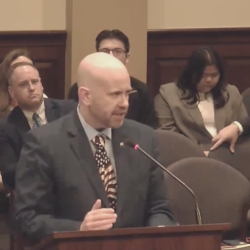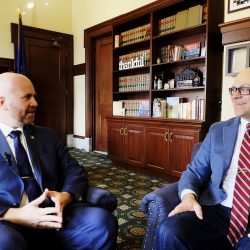It’s time to talk about the Idaho Freedom Caucus. With less than a month until the 2025 legislative session, a simmering dispute among Idaho’s most conservative lawmakers remains unresolved, leaving many people wondering what’s happening, and what it means for next year.
I’ve avoided addressing this issue until now because of my connections to the people and groups involved. Over the past few years, various political figures have sought my help with communications — sometimes on a volunteer basis, sometimes as paid work. In December 2023, I began consulting with the Idaho Freedom Caucus (IDFC) as it was then organized. I coordinated with Maria Nate, Idaho director for the State Freedom Caucus Network (SFCN), and was asked not to publicize my involvement at the time.
My role was never on the strategic side of the organization. Instead, I have drafted newsletter posts about policy and occasionally edited content written by the members. Many of the legislators in the Caucus are excellent writers themselves; my job has been to lighten their workload so they can focus on more pressing responsibilities. Initially, I worked with Maria Nate, but since last summer’s split I have worked directly with IDFC co-chairs Rep. Heather Scott and Sen. Tammy Nichols.
That’s why I haven’t written about the split or subsequent developments except in a few straightforward news pieces. It wouldn’t be fair to my readers to weigh in without disclosing my involvement. However, as the session approaches, more and more people have been asking me to explain what’s going on. I’ve sought and received permission from the co-chairs to share my relationship with the Caucus so that I can have the liberty to explain the situation and provide my perspective.
I want to emphasize that at no time has anyone involved with IDFC told me what to write or what not to write. The Gem State Chronicle will always be 100% my independent voice. It has been a privilege to work with the members of the IDFC and help them communicate their vision to the people of Idaho. I believe in what they stand for. While I cannot claim to be unbiased in this matter, I will do the utmost to present the situation as fairly as I can.
To fully understand the current situation we must go back in time nearly a decade. The original House Freedom Caucus (HFC) was formed in 2015 by conservative congressmen including Jim Jordan, Ron DeSantis, Mark Meadows, and our own Raúl Labrador. The purpose of the Caucus, at a national level, was to unify conservatives in Congress under a single banner, allowing them to coordinate action as well as create a voting bloc that could negotiate with House leadership. HFC voted as a bloc whenever a decision was approved by 80% of its members.
In 2017, Idaho Reps. Mike Kingsley and Bryan Zollinger announced the creation of the Idaho Freedom Caucus, which they hoped would eventually include as many as 25 legislators. This initial collaboration set the stage for legislators to work together as a conservative caucus within the Legislature. Over the next few years, conservative lawmakers such as Dorothy Moon, Priscilla Giddings, Ron Nate, Karey Hanks, Heather Scott, Chad Christensen, Tammy Nichols, Christy Zito, and more coordinated at various levels of formality, but were often stymied because their numbers were just too few and the existing legislative culture was stacked against them. Their Idaho Conservative Agenda, published at the start of each legislative session, always set audacious policy goals.
In 2021, the House Freedom Caucus spun off an organization called the State Freedom Caucus Network, which would extend conservative organizing into state legislatures. GOP strategist Andy Roth and HFC executive director Justin Ouimette were tapped to run the Network. By the following year, SFCN had affiliate groups in several states, each with its own version of the HFC logo and a state director hired by SFCN.
Idaho’s conservative legislators agreed to affiliate with SFCN, making an official announcement just before the start of the 2023 session. Though the IDFC had lost conservative stalwarts like Ron Nate, Priscilla Giddings, and Christy Zito, it gained many new freshmen who were eager to make a difference in Boise. Many of these freshman signed on to the Hazlitt Coalition as well, a network of state legislators under the banner of Young Americans for Liberty (YAL).
The Idaho Freedom Caucus started the 2023 session as an affiliate of the State Freedom Caucus Network with twelve public members and numerous private members as well. Sen. Nichols and Rep. Scott were elected as co-chairs, and Maria Nate had been hired by SFCN to serve as director. The first post on the IDFC Substack came on May 1, 2023, in which the Caucus looked back at “the good, the bad, and the ugly” of the 2023 session.
I began consulting with IDFC in December 2023, shortly after departing my position with the Idaho Freedom Foundation (IFF). Though those two groups sound similar, and have similar goals, they are very much separate organizations. However, the fact that Maria Nate was SFCN director for Idaho and her husband Ron Nate was named president of IFF in early 2024 likely led to some confusion. I remember arguing with a moderate Republican on Facebook a couple of years ago who insisted I was referring to IFF when I had actually been talking about IDFC. As I’m sure you know, IDFC is a coalition of lawmakers while IFF is a policy center and think tank. Both support solid conservative principles in Idaho.
When then Senate Pro Tem Chuck Winder stripped IDFC members Brian Lenney and Glenneda Zuiderveld of their vice chairmanships over statements they made to constituents, the IDFC rallied, striking back with a series of newsletters calling him out for authoritarianism. Winder would go on to lose the 2024 primary, due in part to being heavily targeted by the YAL-adjacent PAC Make Liberty Win.
By all accounts, the 2024 session was tough for IDFC. Tension grew between SFCN and IDFC and relationships grew strained as differences in strategy and philosophy began dividing fellow conservatives. Legacy news media made hay out of an illegally-recorded conversation between Heather Scott and Maria Nate, which I won’t dignify by linking to.
In May, sixteen of the seventeen Idaho legislators who were part of YAL’s Hazlitt Coalition resigned from that group, citing a perceived unwillingness on the part of YAL to listen to their concerns about local matters.
One of the biggest points of contention between the members of IDFC, SFCN, and YAL was over House Speaker Mike Moyle. Moyle was running for a 14th term in office, having been first elected in 1998. Rachel Hazelip, who challenged him in 2022, was running again, and the YAL-adjacent PAC Make Liberty Win wanted to carpet bomb his district in hopes of unseating Idaho’s longest-serving legislator.
Heather Scott expressed support for Moyle’s leadership style in a newsletter in early April:
During this same timeframe, a new Speaker of the House was elected. Let me tell you why this is important. People tend to think that because the House is a supermajority of Republican (> 80%), we can trust them to pass good, conservative legislation. However, twenty-five liberal Republicans (the Main Street Caucus) routinely vote with the 11 democrats to kill good legislation and promote global agendas. The new Speaker, Rep. Mike Moyle has used his experience in the legislative system to balance this great divide. Under his new leadership, there have been many positive changes and opportunities to promote liberty. Conservative legislators have been appointed to committee chair positions, conservative bills are being heard and passed, and many meetings now start with a time of prayer. Structural changes include many internal processes that are taking more control from the executive branch and returning it to the legislature and the people. With Speaker Moyle’s leadership, Idaho witnessed the largest property tax relief package in Idaho history utilizing a legislative override of the Governor’s veto. This marked the 1st successful override of a veto in 15 years. Change doesn’t come fast in Idaho but I’m seeing great signs for the future.
A few vocal Idaho conservatives decried this statement, accusing Scott of selling out, of trading principles for access. The rift only widened after Moyle won reelection by 8.6%.
In June, following the primary election, three members of the IDFC announced they would be stepping away. Sens. Cindy Carlson and Glenneda Zuiderveld, who won their primaries, withdrew from the Caucus along with Rep. Jacyn Gallagher, who had fallen short in hers. Zuiderveld shared her reasons in a very candid Substack post:
I am disappointed that many members were willing to support Speaker Mike Moyle, who would never make the cut to be an Idaho Freedom Caucus member. Some members showed support to him but didn’t offer that same support and dedication to members of the IFC team. How this whole thing took place was due to a lack of good judgment from Co-Chair Heather Scott. It should have been discussed with all members present and our director. We are not a House or Senate Freedom Caucus; we are the Idaho Freedom Caucus, and decisions like this affect the entire team, not just one chamber. And it also affects the State Freedom Caucus brand.
A few weeks later, Zuiderveld joined Sen. Elect Christy Zito and five incoming freshmen legislators at YAL’s 2024 Convention in Orlando, FL. Those same seven, along with Rep. Elect Lucas Cayler, signed a press release last month denouncing the lawmaker pay increase proposed by the Citizens Commission on Legislative Compensation and presenting a resolution to reject it.
In September, remaining members of the IDFC shared some of their side of the story in a Substack post that also announced their separation from SFCN:
The turning point came in a two-minute Zoom meeting last spring. Disagreements in Caucus strategy were to be the topic. Our full Caucus joined and assumed that we would be able to work out these disagreements in good faith. To our surprise, the SFCN’s president muted all of the Idaho Freedom Caucus legislators’ microphones and read a prepared statement in which he demanded that the Idaho Caucus be dissolved and that it be re-formed on the conditions that it alter its self-governing structure, rewrite its bylaws, and adhere to a rigid D.C.-driven agenda. Caucus members were told that they would have to re-apply to be in their own caucus with new applications and interviews. The Zoom call ended without any dialogue; this was a unilateral attempt by D.C. to control the Idaho organization in violation of the clear rules laid out in the Caucus’ mutually agreed upon bylaws.
The hubris exhibited by the SFCN during the call was shocking. This blatant attempt to exercise a coup on our group and dictate the operations of the Idaho Freedom Caucus from D.C. was met with our firm resistance. When none of us re-applied, they started to individually lobby some of us and even worked to recruit some of the Primary Election Legislative winners for their new soon-to-be called “Reset” caucus.
Last week, the IDFC announced four new members: freshman Reps. Rob Beiswenger, Kyle Harris, Cornel Rasor, and Steve Tanner. Just yesterday, however, Sen. Brian Lenney announced that he would be stepping away from the Caucus, explaining that it was not due to any disagreements with current members:
Given the limited time we have on this planet, I’m convinced it’s crucial to cut out distractions and reclaim time wherever possible. That’s why I’m stepping away from the Idaho Freedom Caucus, effective immediately.
I want to make it clear that my decision isn’t due to any wrongdoing or bad blood between members, etc.
The Idaho Freedom Caucus has consistently championed the advancement of conservative values, which I hold in high regard and I’ll continue to work with them to promote these ideals in Idaho.
As of today, there are at least two conservative subgroups within the Idaho Legislature. The existing IDFC continues to operate under the leadership of Rep. Heather Scott and Sen. Tammy Nichols, with former Sen. Scott Herndon hired as director. Its public members now include:
- Sen. Tammy Nichols
- Rep. Heather Scott
- Rep. Tony Wisniewski
- Rep. Elaine Price
- Rep. Dale Hawkins
- Rep. Joe Alfieri
- Rep. Rob Beiswenger
- Rep. Kyle Harris
- Rep. Cornel Rasor
- Rep. Steve Tanner
- Sen. Phil Hart
The second coalition can be seen in the eight legislators who are coordinating their messaging on the legislator salary proposal and issues such as the grocery tax:
- Sen. Glenneda Zuiderveld
- Sen. Christy Zito
- Sen. Josh Kohl
- Rep. Lucas Cayler
- Rep. Clint Hostetler
- Rep. David Leavitt
- Rep. Kent Marmon
- Rep. Faye Thompson
I believe every one of these lawmakers is a good person and a valuable soldier in the fight for liberty. Nothing I say here is designed to disparage or denigrate a single one, nor to question their conservative bona fides. Their presence on one of these two lists means that they are already the most unabashedly conservative lawmakers in the entire state. I’ve gotten to know most of them over the past few years, and I am incredibly excited to see each and every one in the Legislature. Anyone who says I bear anyone ill will or blame any sole person for the current situation is lying to you. My goal here is to help readers understand the dynamics going into the 2025 session so they can be better engaged citizens.
I encourage you to click the links I’ve provided above so that you can read in their own words the perspectives of all the people involved. I’m not looking to force you to pick a side, because I believe both sides are made up of good, earnest, conservative people. My goal is unity and victory, not cutting off my nose to spite my face.
The heart of the current dispute is about who owns the name “Idaho Freedom Caucus”. Does it belong to DC, or to Idaho? Is it a trademark of the State Freedom Caucus Network? Or does it belong to Idaho legislators? According to the Idaho Dispatch, several members of the IDFC are facing “potential legal action” over the issue. I am not aware of the details of that action, and I’ve not seen it reported elsewhere. I’m not a lawyer, much less a trademark attorney, so I have nothing to offer on the merits of the dispute. I’m simply frustrated that the dispute has gone on this long, and I hope the people involved can all work it out. We need our conservative legislators to be free from such distractions so they can focus on the job at hand.
The combined total of both these groups is 19 legislators. That is more than the 18 current legislators who put their names on Main Street Caucus editorials over the past two years. That is more than the 15 Democrats in the Legislature. This is a significant voting bloc! There are potentially many more as well — private members of the IDFC or others who are at least likeminded. If conservatives work together, they will have a huge voice in the upcoming session, and an ability to push through good legislation and stop bad bills. However, if they fight each other instead, then all hope is lost.
I believe we need different kinds of people serving different roles in the conservative movement, and we all should respect others who do things differently. That is what I was getting at with my piece about “No Enemies on the Right” — those of us who are likeminded should resolve our differences quietly and present a united front publicly. At least that’s how I have decided to make my stand.
This whole affair reminds me of the Scripture passage about how members of the Church are all different parts of one body:
For just as the body is one and has many members, and all the members of the body, though many, are one body, so it is with Christ. For in one Spirit we were all baptized into one body—Jews or Greeks, slavesor free—and all were made to drink of one Spirit.
For the body does not consist of one member but of many. If the foot should say, “Because I am not a hand, I do not belong to the body,” that would not make it any less a part of the body. And if the ear should say, “Because I am not an eye, I do not belong to the body,” that would not make it any less a part of the body. If the whole body were an eye, where would be the sense of hearing? If the whole body were an ear, where would be the sense of smell? But as it is, God arranged the members in the body, each one of them, as he chose. If all were a single member, where would the body be?As it is, there are many parts, yet one body.
1 Corinthians 12:12-20 ESV
I believe that a lot of conflict comes from trying to force other people to be more like ourselves. My own philosophy has always been more about persuasion than confrontation. That’s just who I am, it’s the way I work, it’s where I feel most comfortable operating. I know that opens me up to accusations of playing access politics, of compromising my principles, of straddling the fence. That’s fine, I’m used to it. I suggest that critics evaluate outcomes rather than strategies. The proof in the pudding will be what happens in this session and the next. Come April, I will as always share a brutally honest post-mortem with you all, addressing what worked and what didn’t.
I try to extend the same grace to others. Every person in this movement brings unique talents and experiences to the table, and far be it from me to tell any of them that they’re doing it wrong.
I believe that passing conservative legislation in 2025 is possible. I believe we can achieve true universal school choice, lower taxes, lower spending, eradicating DEI, protecting medical freedom, etc. Does that mean these things are guaranteed? Of course not. The biggest fights are still ahead of us. We will have a much bigger chance of winning on these issues if conservative legislators would work together rather than fighting and undercutting each other.
There is also a growing tension with regards to local control. SFCN operates out of Washington, DC, which rubs a lot of Idahoans the wrong way. Is the Network simply an affiliation, a place to share information and coordinate between state legislators throughout the country? Or is it a top-down hierarchy that aims to control its members at the state level? It depends on who you ask.
As they explained in their Substack post in September, IDFC members were outraged when SFCN leaders told them in no uncertain terms that they must change their bylaws and restructure their Caucus. How dare anyone from DC tell Idaho legislators how to do their jobs? On the other hand, if calling yourselves the “Idaho Freedom Caucus” means agreeing to certain stipulations laid down by SFCN, then does that organization have the right to enforce those stipulations so long as Idaho legislators continue to use that brand? Who has the right to call themselves “Idaho Freedom Caucus”?
I don’t know. It’s not my call to make. Hopefully the parties involved can find a resolution that works for everyone, and for the people of Idaho. While national organizations such as SFCN and YAL can be valuable allies in the fight for liberty in Idaho, we must tread carefully. I believe the fact that Prop 1 was heavily promoted by out-of-state interests played a large role in its landslide defeat.
This disagreement also highlights the conundrum of conservative politics. To win in politics requires power, and there is power in numbers. The whole point of the House Freedom Caucus in Washington, DC was to present a unified voting bloc that could confront someone like former Speaker John Boehner with a clear ultimatum: “Do what we want, or we will oppose you.” Such threats only carry weight when backed by numbers. The lone wolf dies, but the pack survives.
Yet conservatives are by nature lone wolves. We don’t like being told what to do. We often see ourselves as standing alone against the machine, the swamp. Idaho legislators should ideally answer to no one but their voters, yet they’re constantly surrounded by countless voices whispering — or shouting — in their ears. Building coalitions and affiliations can achieve great things, but I respect conservatives like Sen. Lenney who have chosen to chart their own path. Brian Lenney is a force of nature, and I’m eager to see what he accomplishes this year. Again, far be it from me to tell anyone how they should be.
This is the situation as I see it. Of course, I am not unbiased — I will never claim otherwise. But I hope I have presented all sides fairly. I’m not asking anyone to take sides, so put down the flags, jerseys, and profile picture frames. The point is not to root for one team to beat another. What I want is for conservative legislators to work together for the good of the people of Idaho, and I firmly believe that is possible. Will we win every battle this coming session? Probably not. Can we win a lot of them by standing together? Absolutely.
I hope everyone involved can put these divisions behind them and get to work for the people of Idaho.
Paid subscribers click over to Substack for a candid bonus note. Not subscribed? Click here to receive daily posts for free or support my work.
About Brian Almon
Brian Almon is the Editor of the Gem State Chronicle. He also serves as Chairman of the District 14 Republican Party and is a trustee of the Eagle Public Library Board. He lives with his wife and five children in Eagle.













